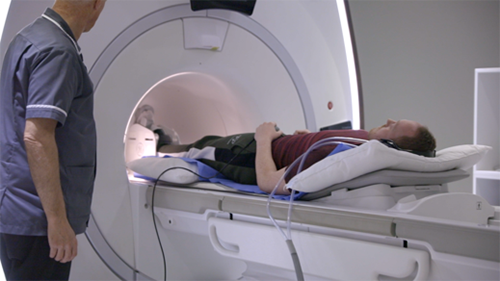MRI scan at Exeter Hospital
- Overview
- What is an MRI scan?
- How will I know if I need an MRI?
- How can I book an MRI?
- How should I prepare for an MRI?
- What happens during an MRI?
- How long does an MRI take?
- How/when will I receive my results?
- How much does an MRI cost at Nuffield Health Exeter Hospital?
- Consultants
- Location
- Guide price
- Ways to pay
- Related articles
- Contact us
Or call us on
An MRI scan uses magnets and radio waves to create detailed images of the inside of your body, helping doctors diagnose your condition. Our expert team at Nuffield Health Exeter Hospital ensures accurate results and comfortable care.
Nuffield Health Exeter Hospital has invested in a state-of-the-art Siemens 1.5T Magnetom Aera MRI onsite as part of our diagnostic imaging suite.
Our scanner offers many benefits:
- Increased comfort – the scanner has a 70cm open bore design which helps the closed-in feeling of traditional MRIs. Additionally, the short magnet allows for the patient's head to be outside the system for many exams
- Faster exams – exclusive Tim 4G and Dot technology provides patients with a faster and more efficient MRI exam
- Flexible appointments – the onsite scanner allows for scans to be performed on the same day as a consultation in many cases
- Increased range of exams – we can now offer Cardiac MRI scans in addition to our existing, extensive range.
What is an MRI scan?
An MRI, or Magnetic Resonance Imaging, is a safe and painless medical test that uses powerful magnets and radio waves to create detailed images of the inside of your body. It helps doctors view your organs, tissues, and bones in detail, allowing them to diagnose and monitor various health conditions. The procedure does not involve any radiation and is generally very safe. Depending on the area being scanned, an MRI scan can last between 15-90 minutes. At Nuffield Health Exeter Hospital, your scan is undertaken by specially trained Radiographers.
How will I know if I need an MRI?
Your doctor may refer you for an MRI if they need more detailed information about your health condition that cannot be obtained through other tests, such as X-rays or ultrasounds. Some common reasons that someone may need an MRI include:
- Unexplained pain: If you have ongoing or severe pain in your body, an MRI can help identify the cause and location of the problem.
- Suspected injuries: If you have had an injury or accident, an MRI can provide a clear view of your bones, muscles, and soft tissues to assess the extent of the damage.
- Neurological issues: An MRI is valuable for evaluating brain and spinal cord problems such as tumours, strokes, multiple sclerosis, or nerve-related disorders.
- Abnormalities in organs: It can help detect issues within organs including the heart, liver, kidneys, or reproductive organs.
- Monitoring chronic conditions: For some conditions such as cancer, an MRI can help track the progress and response to treatment.
How can I book an MRI?
To book an MRI at Nuffield Health Exeter Hospital, you will need a referral from a healthcare professional. If you have an outpatient consultation with a Nuffield Health consultant, they will refer you for a scan if clinically appropriate. You can also use a referral from an external consultant, just email your referral to Nuffield Health Exeter Hospital and a member of the team will call you back.
How should I prepare for an MRI?
- Clothing: Wear comfortable clothing without any metal objects, such as zippers, snaps or metal threads woven into your clothing to your appointment. Remove any metal items from your body such as jewellery, watches, or piercings, before the scan. The MRI machine uses powerful magnets, so it is essential to avoid metal near the machine. You may be asked to change into a gown or other suitable clothing prior to your scan.
- Food and drink: You can usually eat and drink as usual before the MRI scan, unless you are given specific instructions otherwise.
- Medications: Inform your doctor about any medications you are taking. In most cases, you can continue taking them as usual, but it is essential to provide a complete list to your healthcare team.
- Inform your doctor: Let your doctor know if you have any metal implants, pacemakers, or other medical devices, as some of these may not be compatible with the MRI scanner.
- Pregnancy: If you are pregnant or think you might be, please inform your doctor. In some cases, MRI may not be recommended during pregnancy, especially in the early stages.
- Questions: If you have any questions or concerns about the MRI procedure, please do not hesitate to ask your healthcare team. They are there to help and ensure your comfort throughout the process.
What happens during an MRI?

- Getting Ready: You will be asked to change into a hospital gown and remove any metal objects such as jewellery, watches, or hairpins. If needed, a contrast dye may be injected into your veins to enhance the images obtained.
- Positioning: You will lie down on a special table, and the Radiographer will help you get into the right position for the scan. It is essential to remain still during the procedure to ensure clear images.
- Entering the machine: The table will slide into a large, tube-shaped machine. The machine has a wide opening at both ends, so you will not be entirely enclosed, and you can see out of it.
- Making sounds: During the scan, the machine will make various loud tapping or knocking sounds. Earplugs or headphones are required, and music may be provided to help reduce the noise and help you feel more comfortable.
- Communication: You will be in touch with the Radiographer through an intercom system. They will guide you and let you know what is happening throughout the procedure.
- Relax and breathe: The MRI will take images of your body's internal structures. It is important to try to stay calm, relaxed and breathe normally to avoid blurring the images.
- Completion: Once the MRI is complete, the Radiographer will help you out of the machine. In some cases, more images might be needed but this will be explained to you if required.
How long does an MRI take?
The whole procedure usually takes around 15 to 90 minutes. This will vary depending on the number of body parts you are having scanned.
How/when will I receive my results?
Your results will be verified by a Radiologist and sent to your referring healthcare professional within a week of your appointment. Times may vary for specialist examinations, so we recommend checking with the team at Nuffield Health Exeter Hospital before you leave. Your referrer may recommend a follow-up appointment to discuss your results.
How much does an MRI cost at Nuffield Health Exeter Hospital?
Click here to navigate to the guide prices of scans at Nuffield Health Exeter Hospital. Please note that we are only able to provide a guide price until your referral has been reviewed by one of our radiography professionals.
For more pricing information, please contact the team using the form below.
Wonford Road, Exeter, EX2 4UG
Guide price
| Initial consultation | from £0 | |
|---|---|---|
| Treatment | £690 | |
| Pre-assessment | Included | |
| Main treatment | Included | |
| Post-discharge care | Included | |
| Pre-assessment, Main treatment and Post-discharge care | £690 | |
| Guide price | £690 | |
The guide price stated above is an approximation of the cost of treatment only. The final price may vary according to Consultant fees, prosthesis or drugs used and any pre-existing medical conditions which may alter your care pathway. You will be given a fixed all-inclusive price for treatment following your initial consultation with a Consultant.
Ways to pay
Nuffield Health promise
Our prices are all-inclusive. We will equal any comparable price. There are no time limits on your aftercare.
Paying for yourself
There are no hidden costs in our treatment prices. The price you see is the price you pay.
Find out morePersonal medical loan
Spread the cost of your treatment with a 6, 10 or 12 month 0% personal medical loan.
Find out moreMedical insurance
We work with you and your insurance provider to get you the treatment you need quickly
Find out moreRelated articles
Ask a question about this test or scan
Fill in the form below and we'll get back to you within one working day. If it's urgent, you can call us on 01392 276 591.
Thank you
A member of the team will respond to you soon.








